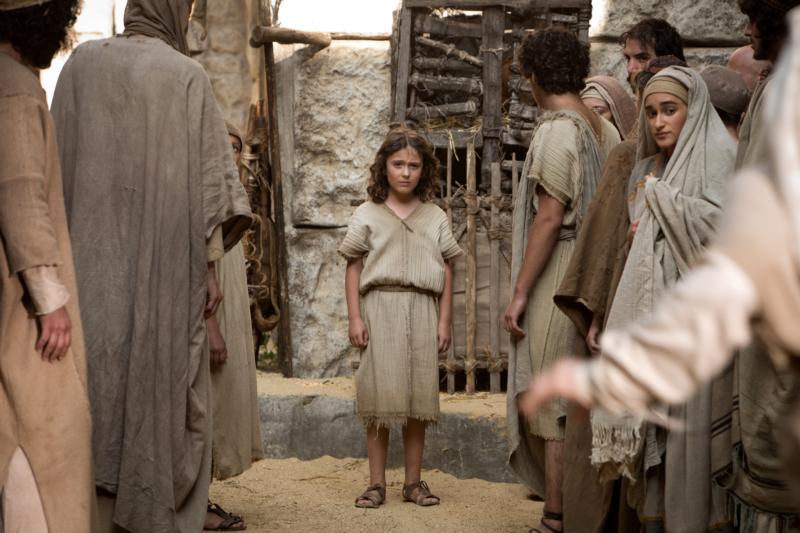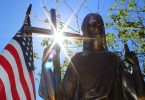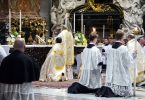
Adam Greaves-Neal stars in a scene from the movie “The Young Messiah.” The director and one of the producers of the upcoming movie said they had the blessing of author Anne Rice, whose novel, “Christ the Lord: Out of Egypt,” inspired the screenplay. (CNS photo/Focus)
by Mark Pattison
MCLEAN, Va. (CNS) — The director and one of the producers of the upcoming movie “The Young Messiah” said they had the blessing of author Anne Rice, whose novel, “Christ the Lord: Out of Egypt,” inspired the screenplay.
Rice had seen director Cyrus Nowrasteh’s previous film, 2008’s “The Stoning of Soraya M.,” and given it a rave review. The film, dealing with execution by stoning in Iran, proved so powerful that, even though the Iranian government had banned it, so many bootlegged copies came in to the country that Iran had to call for a temporary halt to the punishment.
Rice’s agent sent the “Christ the Lord” to Nowrasteh’s agent, and, more than five years later, “The Young Messiah” is set to premiere March 11.
The Rice connection, acknowledged Nowrasteh and Tracy K. Price, one of the movie’s producers, can be troublesome.
Rice, born a Catholic, became an atheist in her teens, and later wrote a series of best-selling novels, among them “Interview With the Vampire.” But in 1998, she rejoined the Catholic Church. However, in 2010, five years after “Christ the Lord” hit The New York Times best-seller list, Rice publicly left the church over its opposition to government-sanctioned same-sex marriage.
Rice still believes in God, Price told a Jan. 28 audience following a preview screening of “the Young Messiah” in the Washington suburb of McLean. “She’s got a thing about organized religion,” he said.
One sign that Rice approves, Nowrasteh said, is that the novel, being reissued to coincide with the movie’s release, is being retitled “The Young Messiah.”
Getting the film off the ground proved tough. “You go to Hollywood and you say you want to make a movie about Jesus and you ask for money, you get a lot of no’s,” Price said. “I got a few hell no’s.”
The movie was shelved in pre-production, after $3 million had been spent, Nowrasteh said. “And when a movie gets shelved in pre-production, it almost never comes back,” he added. But Price and others helped line up additional financing, although the budget was chopped by more than half, from $39 million to $16.8 million.
However, there were providential moments in the process. During the auditions for Joseph, actor after actor appeared before a small group of people as well as the cameras, reciting lines read off-camera by a woman who read lines for Mary, Jesus’ mother. At the end of the day, when asked about casting Joseph, Nowrasteh said he answered, “I don’t know about Joseph, but I’d sure like to see Mary.” The woman who had read the lines, Sara Lazzaro, was ultimately cast as Mary.
And the lad playing the 7-year-old Jesus, Adam Greaves-Neal, “made the hair stand on the backs of their necks” when auditioning in England, Nowrasteh said. Greaves-Neal is Catholic and “comes from a faith-filled family,” Price added, but the boy, who was 9 during filming, “doesn’t like to talk about it.” His prior experience had been small parts on a couple of episodes of the British “Sherlock” remake starring Benedict Cumberbatch, Nowrasteh said, “but he’s getting a lot more work now.”
Once Jesus was cast, “we cast around him,” Nowrasteh said. “Everybody has to have the same accent.” The only household name in the cast is Sean Bean, who plays Severus, a Roman centurion ordered by the now-dead King Herod’s son to kill this boy who’s already performing miracles.
Severus is a character not seen in the Rice book. Neither is the human-appearing Demon. Nowrasteh, who co-wrote the script with his wife, Betsy Giffen Nowrasteh, said “Christ the Lord” was done in the voice of the Christ Child, who alluded to dangers and evil spirits although none ever became physically present in the book. Severus and the Demon were created to make that danger palpable to the viewer.
Nowrasteh said Chris Columbus, of “Home Alone” and “Harry Potter” fame and another “Young Messiah” producer, proclaimed that a scene near the end of the movie between Jesus and Mary was “one of the five best scenes I’ve ever seen in a movie.”






